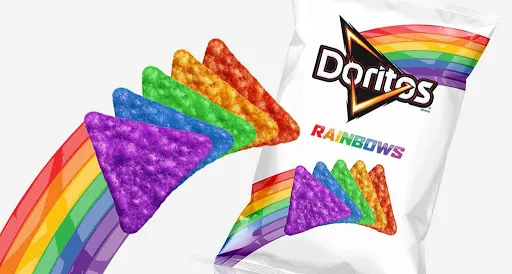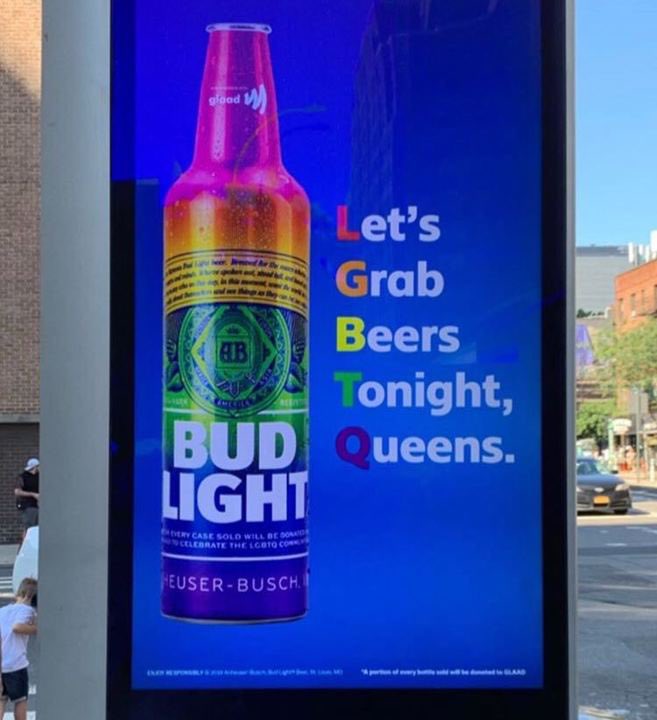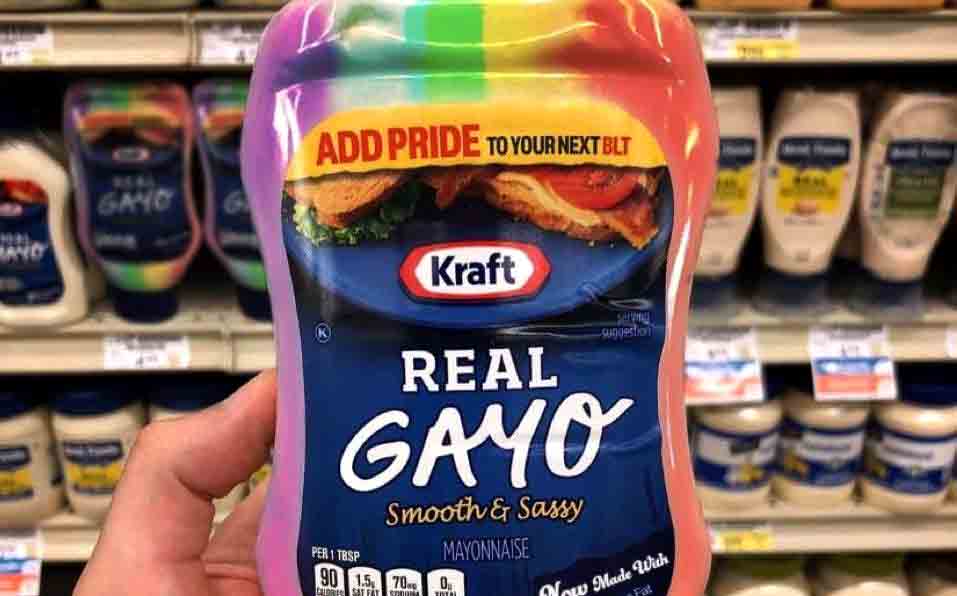
Is Queerness Trendy?
Since I came out around this time last year, I’ve been asked some interesting questions. Some of them have been thought-provoking, revealing of common misconceptions, or hurtful. I’ve given them more thought, perhaps too much thought in some cases, and wanted to share more detailed answers.
Quick note on terminology: In this article, I use common terms I usually try to find better synonyms for today. I’m doing so to portray an authentic quote of how I or others spoke at the time. For example, “queer” was a slur when I was young, but is a destigmatized umbrella term I use to describe myself today.
“Are you sure?”
Yea, pretty sure. As a general rule, you can assume no one has thought about coming out more than the person doing it. I’m more sure after a year living openly, but I can’t be completely sure of anything.
My labels are based on my understanding of the words they’re comprised from. My interpretation of the word love guides me through my feelings for others. My understanding of the words gender, cis, non-binary, and other terms in that realm help me understand myself.
As long as these words continue to mean what they do today, I’m sure which ones do or don’t apply to me. Right now non-binary is the closest I’ve found to describe my gender, but I welcome a future when I find something more specific for the way I perceive the world and my role in it.
“What validates you?”
Sometimes little memories come up since I began accepting myself this way. Things I repressed or ignored before, like singing and dancing to Girls Just Wanna Have Fun by Cyndi Lauper when I was very young (pre-Kindergarten). It was the first song I remember thinking of as my favorite.
Sometimes I notice myself doing something and feel the learned impulse to suppress it. Tiny things like holding my wrist certain ways, walking lightly, the way I eat certain foods, drinking out of straws, or sitting in comfortable ways for me that might look queer to others. I still feel the impulse to hide them, but I’ve pushed past those impulses and felt much better for over a year now.
Dating bi/pansexuals who appreciate my uniqueness has been great. I don’t see the gender spectrum as a line between two points, but being called “the best of both worlds” is a really nice compliment. I don’t feel the need to round myself up to man or woman to please them. I can simply be.
Having LGBTQIA+ friends who lift each other up. Coming out has allowed me to be a full member of the communities I previously only stood on the sidelines cheering on.
Correlation
Another confirmation of my feelings is the way I’ve gravitated toward queer folks for most of my life. I’ve loved Pee-wee Herman since long before I ever knew his real name — let alone that he’s gay.
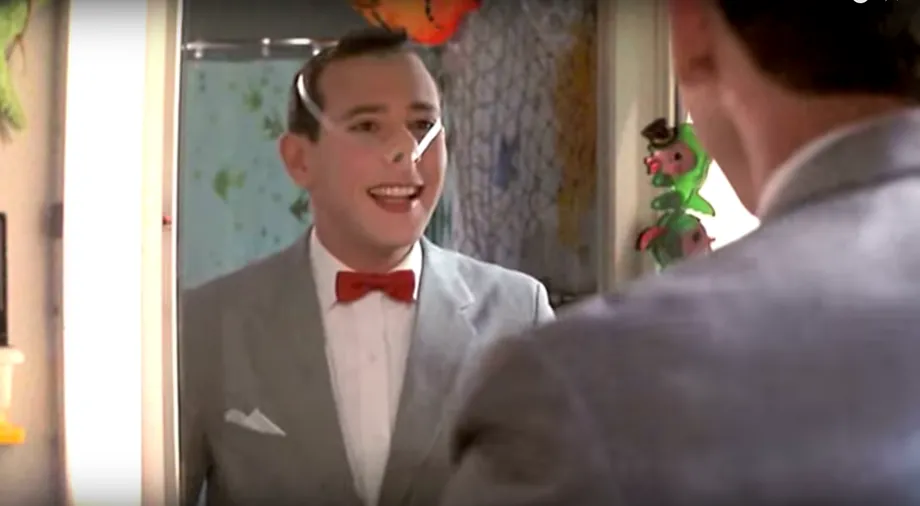
I had a subconscious predilection for hanging out with other kids who also ended up some flavor of 🏳️🌈. When I consider the friends I sat around the lunch table with in high school, it’s more than half of them. I’m the most recent one to come out.
After my dad married my beloved stepmom, I met her big Irish family. My favorite new kin was Bill, the partner of one of her brothers who liked to play chess with me. He, like another uncle I grew up looking up to, had an attitude and perspective I understood more easily than other adults.
This is part of what makes the right-wing talk about “grooming” so terrifying. It was rare for me to meet adults who understood me, and I didn’t get to see them very often. I don’t remember any of them directly telling me they were gay, and none of them made attempts to glorify it. They just existed. I can’t know how much hiding they were doing, but I suspect they weren’t anywhere near as open with their identities as all the heterosexual adults were.
I look back at my twenties and early thirties sometimes and remember the knowing smiles I’d get from queer friends when I’d mention I was an ally or I appreciated them letting a straight dude into their club, lounge, or party. At the time I was oblivious, but now I feel the way they must’ve when I talk to younger folks who trigger my gaydar. (Some may be reading this: Thanks for not pushing me too early.)
Looking back at all the correlations over the years through the lens of who I’ve learned I’ve always been has often made me think “Yikes, it was obvious all along. Why did it take me until my late thirties to figure it out?”
“… But are you really sure?”
What if I come out and then realize it was a mistake?
I considered this constantly in the years after my divorce. I was dating all kinds of people as an established adult in a city and state where I finally felt at home. I revealed parts of myself to these new relations I had always been afraid to before. Sometimes the responses were disgust and rejection, but more often it’s been excitement and greater connection. Enjoying the latter has definitely been worth enduring the former.
If anything was going to send me screaming back to masc-masking it would be feeling unsafe. Getting fired, passed over for career advancement, shunned socially, or — heaven forbid — assaulted could all drive my cowardly ass back into the closet.
When I unpacked that, it dawned on me: When I imagine acting like a cis male again, it feels like an act. Like wearing an uncomfortable outfit to church on Sundays as a child, I would only be doing it under duress.
Duress
There are moments when the contempt is palpable. Strangers stare, wear open disgust on their faces, mumble comments under their breath, or even shout them across rooms or from passing cars. I felt it before I ever came out, too; just for looking and “acting like a queer”.
Most don’t notice all the cultural microaggressions dwelling in the white noise of their daily life:
- Separations by binary gender in irrational places — bathrooms were only the beginning.
- Marketing questioning if the target is “man” or “woman” enough, and often charging one group more for it. Including children in it is especially insidious.
- Statements like “the reason things are bad is because kids need a mother and father”, blaming the world’s ills on innocent families who don’t precisely fit the nuclear definition.
- Commenting how political correctness or wokeness are ruining everything. Those buzzwords are often shorthand for the fight to not be harassed, discriminated against, fired, or arrested for protected characteristics. Thinking it’s ruining things reveals they’re against that fight.
- Gripes about cancel culture are everywhere, and usually pass without considering the most prominent celebrities being canceled are usually real predators with human victims. They’re not only walking around in plain sight, but also getting elevated to visible platforms.
- Political signs on lawns and businesses aiming to invalidate the fight for civil rights.
- Anti-LGBTQIA+ sentiments thinly veiled behind “religious liberty” and the accompanying persecution complex of American evangelicals.
- Citizens, and sometimes officials, walking around with white supremacist symbols openly displayed on their body.
- Open support for torturing LGBTQIA+ children.
Some of these biases aren’t directed at me. A neighbor having anti-BLM sentiments may not affect me directly, but I have several loved ones who it does affect. These views also reveal a readiness to dehumanize those who are different in harmless ways, which tends to bleed over into traits that apply to me too.
Many of these symbols and actions are the product of ignorance to how they make others feel, but some are displayed intentionally to make their target audiences feel unwelcome and unsafe. It’s hard to know the difference. And when citizens also vote along those lines, the real world impact is undeniable.
Open KKK rallies may largely be a thing of the past, but modern predators have found new ways to communicate the same messages. It’s much easier for the average person to walk past alternate-color American flags without flinching than it is to walk past flaming crosses.
I wish we had an empathy machine, but the technology for revealing these things to folks who don’t see them (and often don’t want to) hasn’t been invented yet. There’s not even an app to stop someone before making an off-handed comment that will unintentionally hurt their loved ones. We can only share our experiences, try to relay stories we’ve heard from others, and hope they hear us.
Regardless of how others around us act, it’s not like we can stop being the things they hate. We can only try to hide, make ourselves smaller, accept the known negative health outcomes, and let the haters keep winning.
When a loved one asks us to do that, it isn’t as protective of us as they might think. It’s protective of the society and systems putting us in this position.
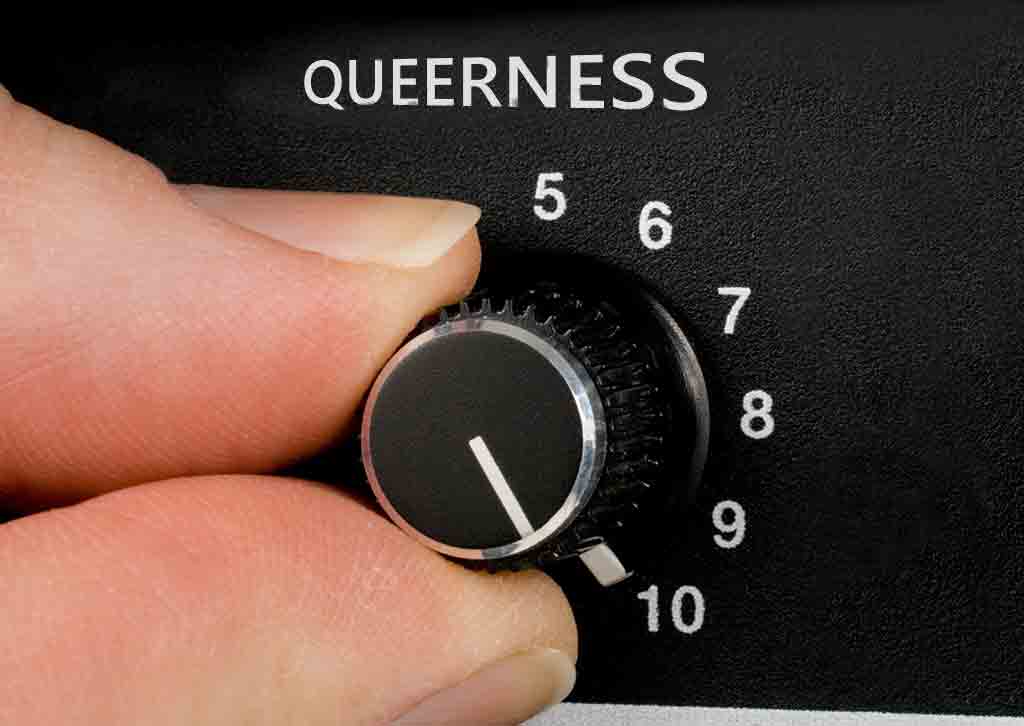
Location Matters
It’s hard to know how the place we grew up compares to the rest of the world until we leave.
The first place I moved to was Phoenix, which is one of the worst places (socially) I’ve ever been. Even before there were controversies over bathrooms and pronouns, this city was extremely unfriendly to anyone who wasn’t joining in on bullying the outliers. Anyone who knows the saga of Joe Arpaio should see why Maricopa county is a constant human rights atrocity.
Las Vegas was my favorite place to live before I arrived in California. The more accepting culture there regarding weird folks in general played a big role. Returning to New Jersey to visit from Las Vegas was the first time I started to notice how invalidating the general vibe can be in certain areas of the state.
Maryland was an awful place to live, but mostly fine socially. It had the same combination of suburban hell microaggressions and urban aggressive street harassment as New Jersey and New York do, but these are my baseline expectations after all.
More recently I’ve had the ability to do some international travel. In Mexico there’s a huge macho hyper-masculine culture, made even more famous in American stereotype-happy media. Even so, I’ve generally felt more accepted there than I do in some suburbs here in the U.S.
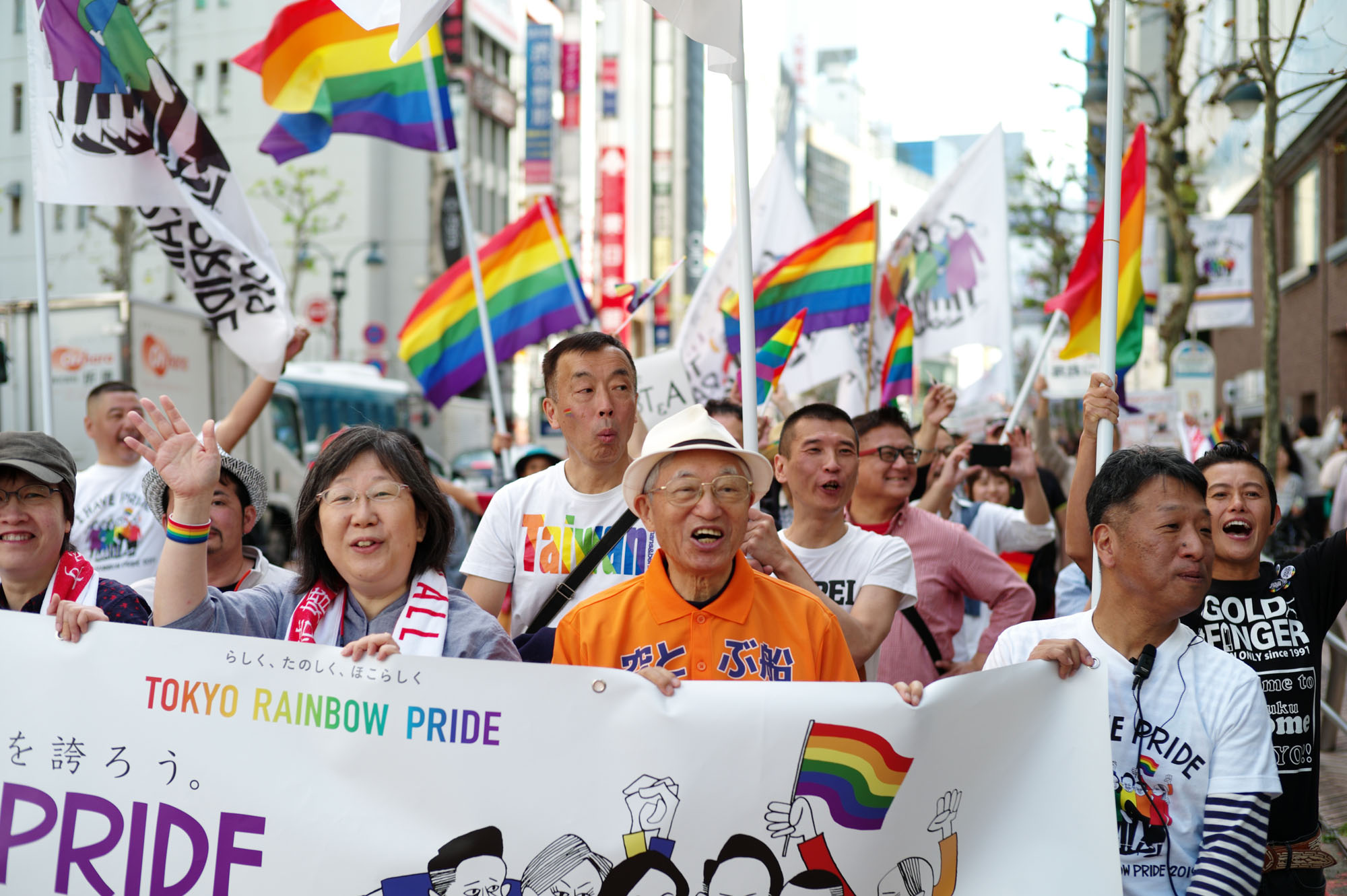
In Japan I’m a gaijin. Citizens don’t hold non-Japanese (or Japanese-passing) people to the same high standards for conformity and perfection they hold their own to. I’m stared at nearly everywhere I go, but it never felt like hate; it felt like curiosity or wonder. (I’m sure if I tried to emigrate there and get a job there’d be plenty of hate, but not as a tourist.)
Seoul was more progressive and accepting than Tokyo. The indifference we felt from the locals was notably pleasant for both me and my dark-skinned partner. While I know much less about Korea than I do Japan, it doesn’t seem like they separate foreigners from their society as harshly there.
Even in the mighty San Francisco Bay Area, I still get the occasional slur shouted at me from passing cars or ranting crazies on the street. They still exist here, but they’re the outliers — outnumbered by rainbow flags and “all are welcome” signage. It’s not like I can’t leave the area safely, but this place is certainly my oasis. 🌴
Duress isn’t new.
It surprised me how little changed after coming out. I expected strangers to harass me more often walking around in a dress with my longer hair and full beard, but it’s felt like roughly the same ratio as before. I was already getting the negative attention I was so afraid of.
It’s weird to realize my bullies knew so long before I did.
The first time I learned of homosexuality was when a fourth grade classmate called me faggot. I was never a cool kid who knew all the slang my classmates used and I was made fun of for that, so I pretended I knew what it meant, took cues from their tone, and retorted with an exquisitely cunning
“nuh-uh!”
That moment echoes in the repressive impulses I still feel today.
As time went by, I was called these words more — usually while I was hanging out with my friend Chris, who I was always getting in trouble with because we walked to school together every morning. I eventually asked someone (I don’t remember who, but it was an adult) what it meant.
Discovery
I may not recall exact happenstance of my younger days, but I remember specific feelings I had when learning something new vividly. The moment I learned what gay was, and subsequently that the word faggot was intended as a mean way of saying it, I remember feeling both “Wait, we can do that!?” and “Why is that a bad thing?”
I grew up in a liberal household in a low-income neighborhood in a blue state, attending public schools, and watching PBS. Even I knew little of gender and relationships beyond boys and girls are the two ways we’re stuck being, and we all have to pair off at some point (unless we’re some sort of loser). I was 9 years old the first time I realized this wasn’t true.
I thought men only cross-dressed for laughs, like on Monty Python. My dad showed me Rocky Horror Picture Show at some point, and while I loved Time Warp I didn’t feel represented by it’s camp over-the-top sexual theme.
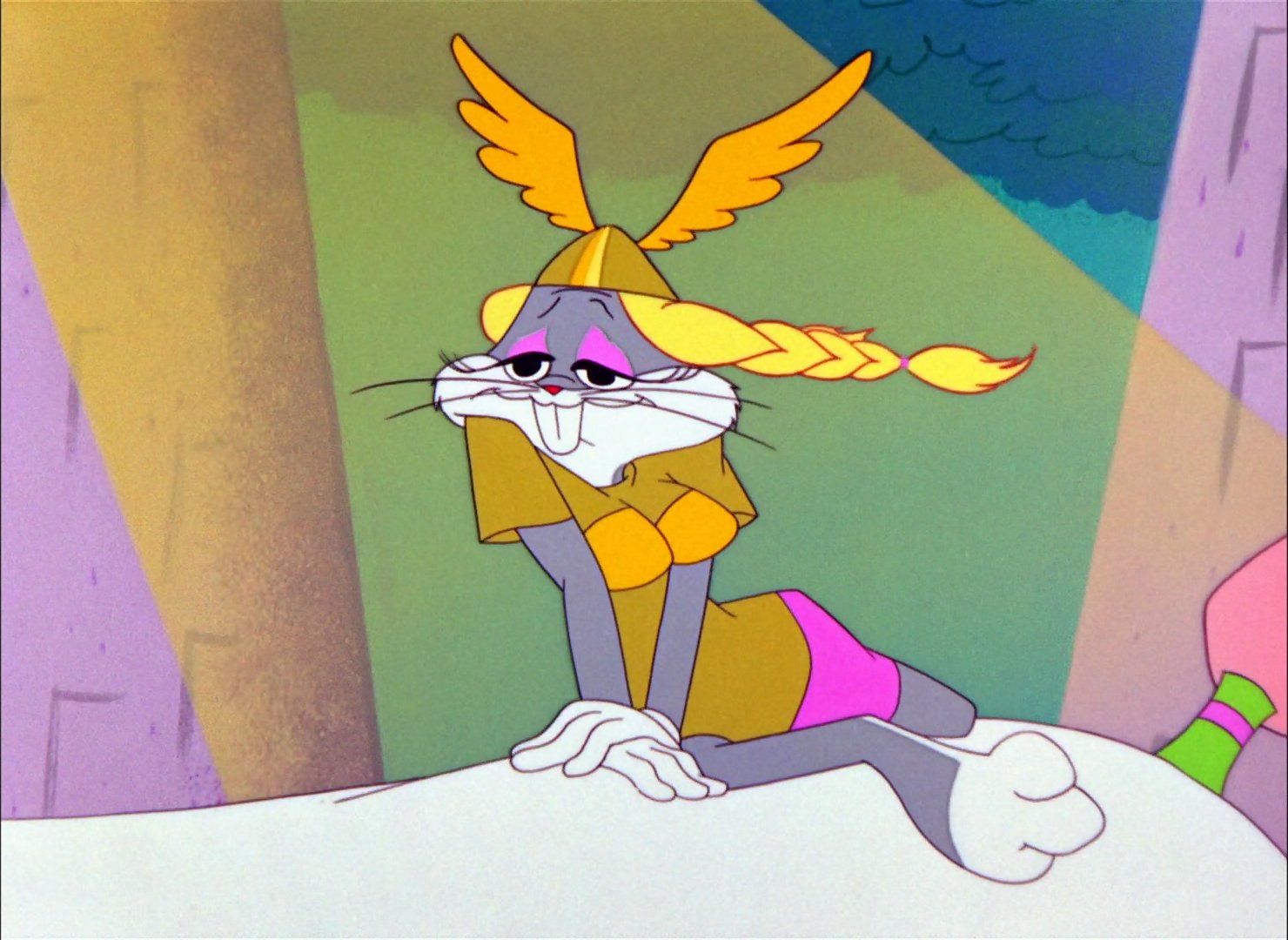
I learned of the gender spectrum in my thirties, so I’ve had less than a decade to contemplate these possibilities. Before that, I spent years thinking and writing about How Manly Am I, and What Does That Even Mean? and other ways of rationalizing my feelings.
Know what? Maybe a timeline would help.
How my options unfolded:
- (pre-school age) I am a boy. Therefore, much of my life is already set.
- I will like girls
- I will one day will be a dad
- I will need to be the bread-winner for my family
- (all the other things a man does, according to social cues and media)
- (kindergarten-ish) Sometimes I wish I was a girl, because I don’t like doing boy things all the time.
- (elementary school) I didn’t understand at the time, but the moments when I was bullied and assaulted by classmates usually included anti-gay slurs.
- (4th grade) That‘s what those words mean!?
- People can be gay? Am I gay?
- Maybe that’s why I feel so different and why the kids call me names.
- Will I be bullied more if I’m really gay?
- (middle school) I don’t really “like like” anyone, but girls are cute I guess.
- “Why are our sex ed classes held separately for boys and girls?”
- “Why do boys get the disinterested idiot gym teacher while the girls get the nurse who went to medical school and cares deeply about the topic?”
- To my brother: “Do you think [relative we both like] is gay?”
- I was beat up one day after school because of the way I walked. I practiced walking in the mirror so I was less bouncy for months after. When I confided in a teacher, he told me it was a good thing because I learned how to walk right.
- (7th grade) I had my first crush on a friend.
- There was going to be a dance that year and she was the girl I liked most in my class.
- Expanding feelings of friendship and admiration to “like like” seemed natural.
- Cool as she was, without the dance and its associated social pressure to go with a date, I may not have fostered these feelings. It was still early for me.
- I acted really weird toward her, but based on awkward stories of adolescence that’s pretty standard. I hope it didn’t give her a complex.
- She said yes when I finally asked her. The dance was fun. We’re still friends. 😊
- (8th grade) I have my first truly passionate crush on a classmate. I definitely like girls.
- This is the first time I remember feeling what I now understand is lust.
- Some boys are okay, but girls definitely! Since I have to pick one or the other, I pick girls!
- Exceptions were made for Trent Reznor, Tyrese, Gavin Rosdale, and a few others. I openly said this to friends as if it was a joke. 🙄
- (9th grade) I moved to a new school, in an entirely new county and district where I knew no one.
- The way I was welcomed felt strange at the time. I chalked this up to it being the first time I went to a majority white school, but I was suspicious of it.
- Either way, an opportunity for a fresh start was welcome.
- (age 15-19) I still feel different, despite looking more like the other kids here.
- Girlfriends told me I was different too. Some rejected me for not being manly enough.
- Being a girl still seems really cool, but really hard. Probably not worth it. (I still feel this way)
- I have crushes on boys sometimes, but ignore them because I’m not gay (I already know I like girls, after all).
- Access to internet porn raises more questions than answers: I learn trans people exist in the most dehumanizing way.
- The bullying resumes, but in far less severe ways. Less violence, and I had a clique of close friends around most of the time.
- (age 19-21) Maybe I’ll just kiss this one guy.
- Nope! Didn’t like that. Confirmed not gay. (repeat a few more times)
- I don’t think I want to be a dad. Does that make me less manly?
- (age 21) This woman I like thought I was gay before we kissed. She seems cool with it though.
- (age 21+) When I learn new things in the LGBTQIA+ world, it fascinates me deeply.
- Academically, of course. Not because I have any stakes in the matter or anything.
- I learn of bisexuality, but through the ignorant lens “a phase between gay and straight”.
- I learned being called faggot all the time and beat up for it isn’t a universal childhood experience. I assumed it was until talking to college classmates.
- [2004] George W. Bush promotes a constitutional amendment to ban gay marriage.
- (age 23-29) Hard times traversed with a supportive partner.
- I grappled with the meaning of love nearly constantly.
- I read Gender Outlaw: On Men, Women and the Rest of Us by Kate Bornstein.
- I toyed with the idea of transitioning entirely in the hypothetical.
- An unspoken part of my hesitation to get married was closing the door on my freedom to experiment more.
- I definitely don’t want to have children.
- [2008] Prop 8 passed in California and banned gay marriage there.
- (age 30-32) Married life is mostly what I expected it to be. Not quite as bad though.
- [2014] The Wikipedia entry for non-binary gender is published for the first time.
- I learned the infinite grey area between the two cis genders, and men and women are not polar opposites (or different species, or from different planets, or all the other garbage society had told us to this point).
- I finally get the vasectomy I’d wanted for years.
- I read Come As You Are by Emily Nagoski
- (age 33-36) Divorce. Dating again. Experimenting.
- Revealing parts of me I’ve found solid footing on to more friends as I feel comfortable.
- Openly telling partners and friends I still love my ex-wife and some others (not yet using the term polyamorous)
- (age 36-ish) For the first time, I asked a partner how she’d feel about me occasionally dressing more feminine. It wasn’t received well. I dropped it.
- (pandemic) Lots of time for intense introspection, reading, and re-examining every aspect of life.
- I began to accept the grey area was where I might belong.
- (age 38) A breakup, vaccines, purchasing a home, and…
- Dating as non-binary, pan/bisexual, and trying out polyamory.
- Came out gradually to more people over a few months before going public.
- Began dressing and presenting however I want in more places.
- Stopped repressing non-masculine mannerisms and behaviors for the first time.
I hope this helps hammer the point home: I’ve always been this way. I lacked the language to talk about it. We lacked the sex education resources to even think about it constructively until fairly recently.
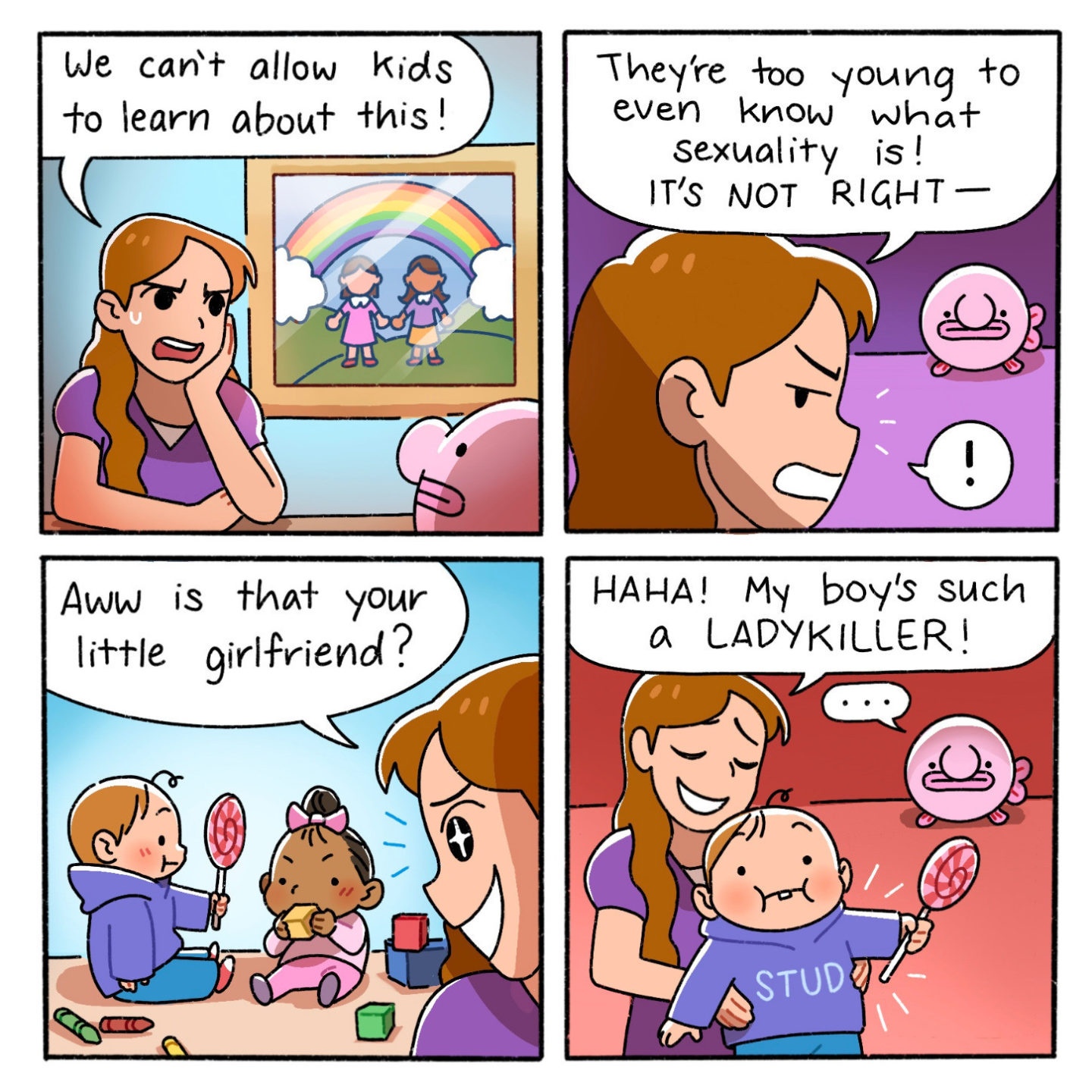
To this day, many groups want to hide our existence from children. They are trying to continue the culture that delayed my understanding of myself for decades. I hope the kids growing up today who can see representation in media, can research their feelings and get words for them, and discover who they are much earlier than I did.
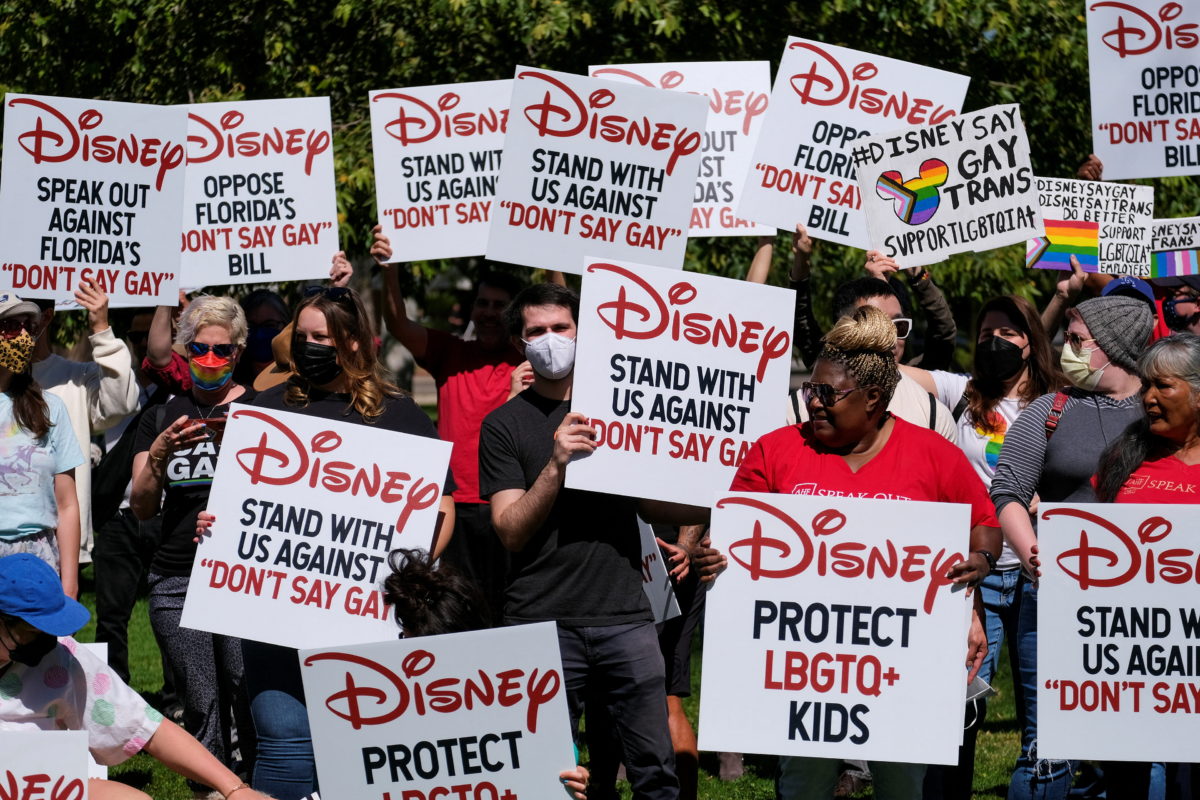
Is being queer the cool thing to do right now?
This has many answers, and I’m pretty sure I did okay when I tried on the spot. After a few months of consideration, I want to break it down into a few topics.
Believing queerness is inherently cool is perfectly fine, but this perception comes more from factors queer folk tend to lean toward or must undertake to discover who they are in our social environment.
Before I move on to discussing those factors, I want to address the elephant in the room where this question is asked: Thinking people are falsely coming out to jump on a bandwagon for a passing trend is extremely disrespectful. Not everyone who comes out keeps the labels they take on that day forever, but it doesn’t mean they were lying. It means it’s so difficult to fully understand these traits without the freedom to experiment, learn about them, and see role models we can relate to.
Why does queerness sometimes seem to correlate with coolness?
Self-Actualization is Cool
Occasionally I forget that exploration of self — this thing I can’t help but do, no matter how much it sometimes hurts — is something many rarely think about. It’s hard work, it’s risky, and it can be scary. My path has included intense therapy, traveling, trying to understand those who aren’t like me, psychedelic drugs, critical consumption (of media, goods, and services), and lots of reading. It’s common to lose friends, family, and sometimes even employment while exploring our identities. When I consider it all at once, it’s daunting.
I like to think I’m fairly interesting to talk to because of it though. I don’t know the recipe for coolness, but I believe being interesting is probably an ingredient. Having personal stories others want to hear, holding thoroughly considered opinions while still flexible to new information, listening to others’ experiences in affirming ways, and accepting kind folks for who they are — no matter where they are on their own journeys — are all things I’ve learned from confronting my fears, biases, and insecurities.
It’s often difficult to admit these daggers I point at myself sometimes also get projected onto others like me. Compassion for myself came after compassion for others, once I allowed myself to see parts of me in them.
Bravery is Cool
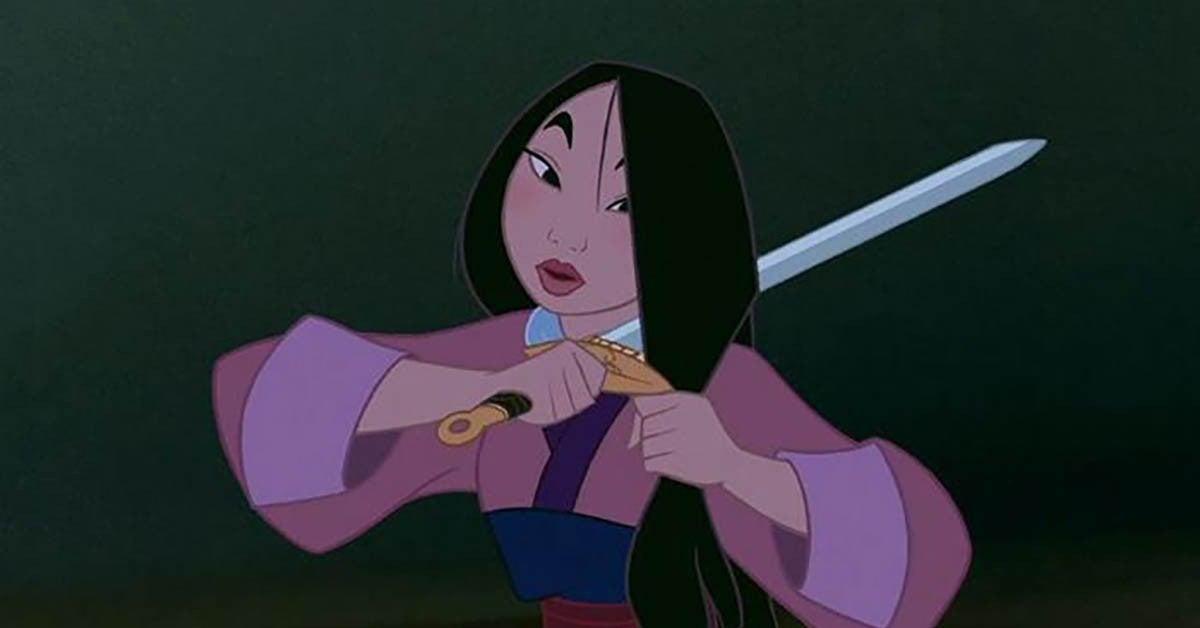
Throughout human history, society has demonized harmless powerless people for personal gain. This is unlikely to change in any absolute sense. We may’ve stopped burning women alive because they knew how to read, but we still marginalize millions in other ways. For the few who are able to “pass” as normal, it’s understandable for them to feel more comfortable in the shadows. There’s no shame in staying in the closet until we’re ready.
With that in mind, the moment we’re brave enough to face those fears, be vulnerable, and open ourselves up to the scrutiny of those we love is incredibly cool. Strangers aren’t easy to show ourselves to either, but the thing I feared most was discovering close friends and relatives may have more conditional love than I realized.
Obviously, the goal is to make coming out a thing of the past. At some point, humans around the world will think it’s weird anyone ever had to. It being cool for a decade or two before we get there is a nice tiny counterbalance to all the negative aspects of queerness, if that’s indeed what’s happening right now.
Aside: Self-Censorship
When one experiences queerness from the outside, they often only see the affirming part. They see us being ourselves, smiling at rainbow-colored parties, and the encouraging comments from our carefully curated chosen family online. The connections who unfriend and block us* without a word once we post those aren’t noticed by anyone else. No one sees the direct messages we receive “disagreeing with our lifestyle” or “loving the sinner and hating the sin”.
*I'm using social media parlance here, but I'm also referring to the equivalent real-world losses of social connections.Even my parents are unaware of all the comments relatives have made in front of me or to me over the years. They probably don’t know why I stopped talking to some extended family members after I moved away.
This is part of why I try to balance the good news with real shit. I’ll never share all the bad, especially if it might compromise the privacy of those involved, but sharing none of it paints a pleasant but woefully inaccurate picture of my life. I want my community to love the truth, warts and all.
Yesterday, while discussing writing this article, my partner asked if I was going to address the violence and bullying I experienced. I’d recounted it whenever we discussed our histories before, but I didn’t mention it in my first draft.
When she asked me why not, I speculated I was protecting my audience — comprised partially of relations who were in my life back then and may feel terrible for not protecting me from it at the time.
But censoring my story this way is likely a significant part of why it’s so hard to get others to understand what I and other like me went through. I’m not helping anyone understand each other this way.
Queer People Objectivize Themselves More, for Better or Worse
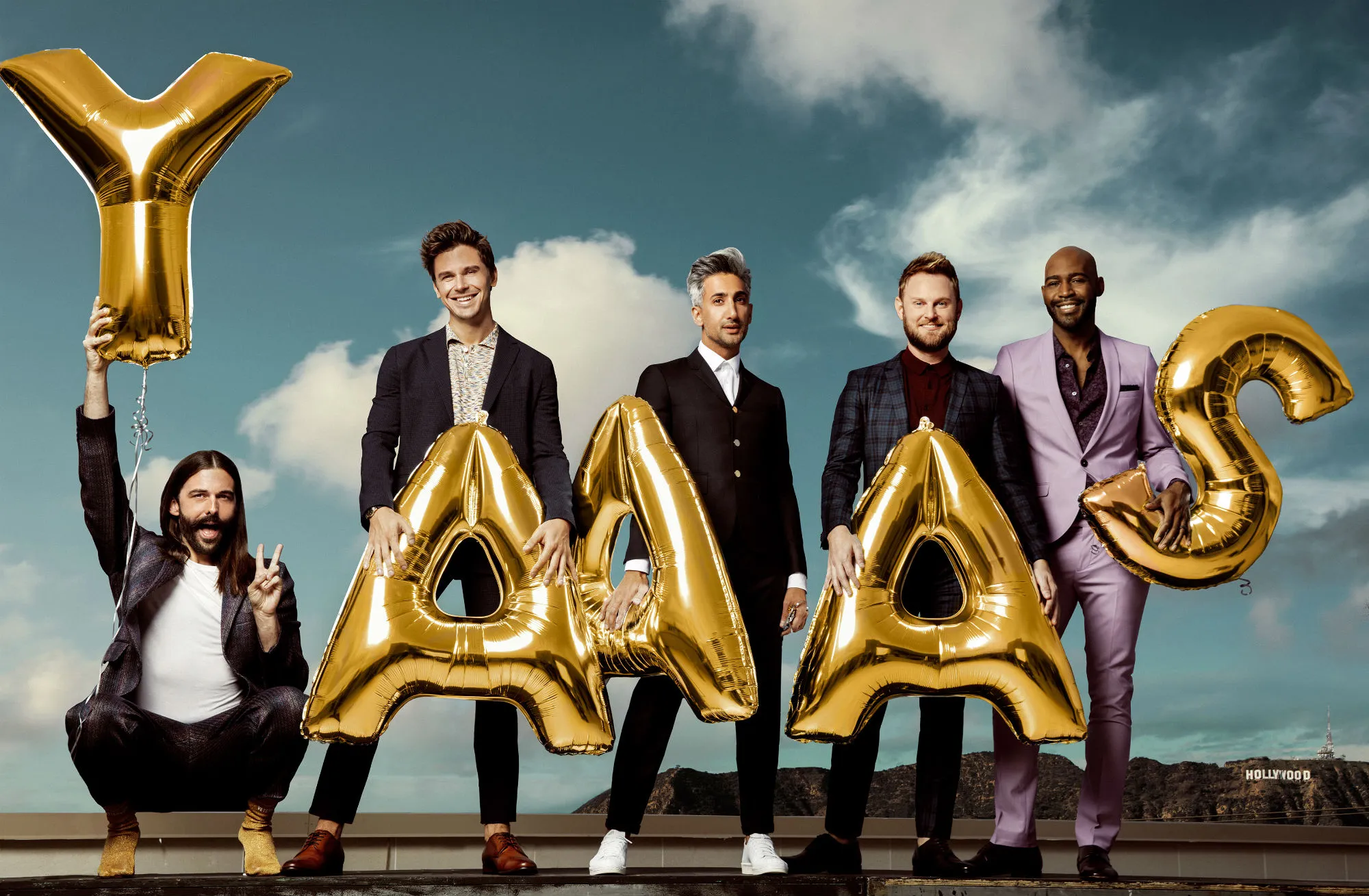
When one can see others who look like us as beautiful, it can make it easier to see ourselves that way too. It can also make it easier to focus on negative comparisons, but those stories are often part of the censored portions of our stories.
Living in denial for most of my life prevented me from seeing myself as beautiful. I neglected my appearance because I didn’t understand how it affected my inner well-being. I took little interest in self-expression beyond baggy t-shirts with stuff I liked printed on them. I didn’t take care of myself for years, especially after my car accident. I deprioritized my physical health behind trying to survive and stabilize my life.
Gay dudes hit the gym way harder than straight guys. Their beards and bodies are shaved carefully and intentionally. Their wardrobes, diets, and homes have so much more thought put into them they actively coach others on how to do the same on television.
Queer folks also tend to see unconventional bodies, styles, and expressions as attractive more often than mainstream society does. Hanging out with bears and otters made it easier for me to see some of my rounder, hairier bits as sexy. For a long time, I thought no one would want me if I wasn’t 100% masculine all the time. Meeting and dating trans and non-binary folks helped me feel more confident coming out on dating sites and finding matches who wanted the real me.
Having this confidence has helped me take better care of myself and has greatly improved my mental health. These things feed each other, and the results are visible. Exemplifying health and happiness is cool too.
Speaking of the challenges we face seeing ourselves in the mirror…
Gender Euphoria is Awesome 🌈
Much like how those who don’t experience chronic pain can’t really know the feeling of pain relief, being born comfortable with one’s body and the societal role assumed by it prevents them from experiencing gender euphoria.
Cis folks certainly have leisurely things they do to affirm their genders. Men can go hunting, watch action movies, and fix stuff around the house. Women can cry at sad movies, work on the garden, and read romance novels. These activities can provide a dose of those happy brain chemicals, but the euphoria we feel is quite different.
I’ve debated with friends about how to describe gender euphoria to cis people. So far, this is the best metaphor I’ve come up with:
It’s your wedding day.* You’ve spent thousands of dollars and months planning every detail. You’ve chosen the perfect venue, written the exclusive guest list, hired the best photographer, had your hair and makeup done exactly the way you like, and chosen clothing perfectly tailored to your body and aesthetic tastes.
You naturally stand up a little straighter. You smile and blush a little when you see your reflection. Perhaps you do a pose or spin in front of the mirror. You normally hate posing for photos, but today you can’t wait.
*Not into weddings? Exchange the setting with a sweet 16 party, cosplaying for a convention, walking the red carpet, or whatever resonates. You do you, boo.
Most recently, I received my updated Real ID license (I’m always tempted to share a picture of it but obviously won’t online, so ask me to see it in real life!) with my “Sex” listed as “X” instead of “M” and that was a moment of validation and gender euphoria for me.
I would trade this feeling for a world where no one feels dysphoric in a heartbeat.
I compared it to pain relief for a reason. Gender euphoria isn’t an additional pleasant feeling appended to a baseline of normality. It’s a feeling of normality compared to a baseline of shame, self-hatred, anxiety, and discomfort. Those under the trans umbrella live with dysphoria as the reality of our daily lives until we have the safety and resources to be our true selves. Even then, euphoria only kicks in once in a while.
Every time I go to the airport — especially in an unfamiliar place — I fear the moment I show the ID I’m so excited about to the TSA agent. Some airlines only provide options for Male and Female in their passenger registration, and if it doesn’t match my ID they can stop me from entering. It’s up to each officer to decide if they want to give me a hard time, but so far it hasn’t been a problem yet.
So while I’m sure it looks super fun and rewarding in the moment, I doubt anyone who experiences it thinks the price is worth it.
It’s Never Been a Choice
I hope we don’t have to continue making this clear much longer, but the language some are still using in 2022 reveals a mindset that our identities are a choice. “Is being queer the latest fad?” plays in the same grey area around others like it.
- “Oh, so you’re gay now?”
- “California turned them gay”
- and the one we get every year…
Why isn’t there a Straight Pride Parade?
This 99% rhetorical question comes from a similar place, but with an added edge of resentment and entitlement. We can answer with the same response we give children on Mother’s and Father’s Day, or moronic men on social media whenever International Women’s Day comes around: There is!
There’s also been several straight pride parades I encourage everyone interested to check out. They seem like a really fun time. 😑
The links above should explain everything, but suffice to say: Heterosexuality is everywhere. If the “Don’t Say Gay” bill in Florida hasn’t made it clear already, there’s not a day that goes by where we don’t see dozens of references to men and women (gender!) and romantic relationships (orientation!).
I don’t want to spend more time on this explanation, because I hope anyone who’s made it this far into the article understands this point is obvious.
Everyone knows what it’s like to feel unwelcome.
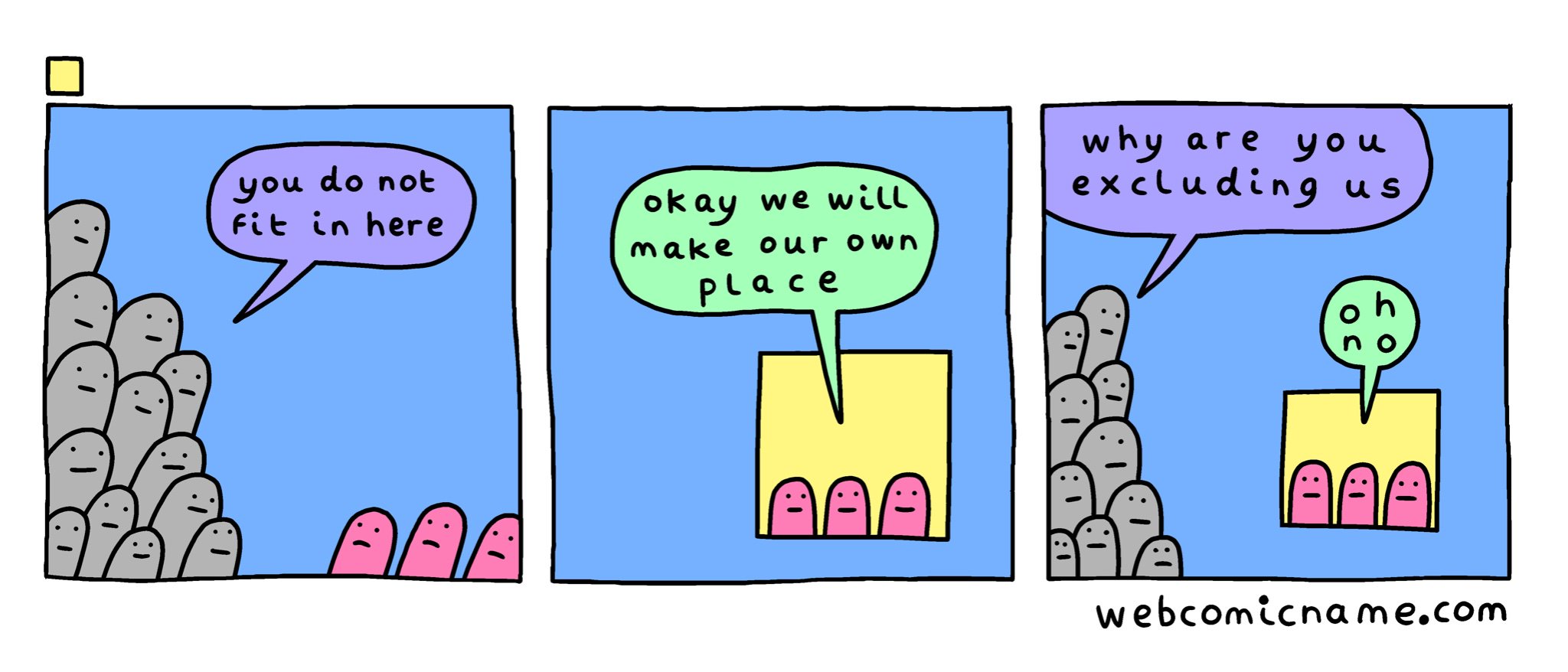
We walk into the wrong rooms at a parties, arrive places without knowing the dress code, or enter biker bars as a non-biker. We get flustered, excuse ourselves, walk away, and randomly dwell on the memory in the shower for the rest of our lives.
What happens when the places we feel unwelcome are:
- at work or school?
- at church (or other religious events/locations)?
- at the grocery store, pharmacy, gas station, restaurant, shopping mall, […] ?
- in government buildings we’re required to enter on occasion?
- in airports and other transit hubs?
- on public streets, simply walking around?
- in our own homes with our family?
Pride is one of the rare occasions when people asking why they can’t participate in queer culture are experiencing the feeling some of us experience constantly. They can talk to their therapist about it, like we do (if we have the resources).
Extraction from Marginalized Cultures
It’s disappointingly common to enjoy the art of marginalized cultures while turning a blind eye to the people, events, and perspectives it comes from. Outsiders tend to expect them to perform on demand, often while taking actions that actively harm those communities.
Many of my friends remember when Ellen came out in 1997 especially clearly, because many of us heard loved ones react badly to it. “I used to like her, but that’s disgusting” was a common reaction, often stated — knowingly or not — in the presence of children. Large groups actively campaigned to get her taken off the air. Until that moment, they were happy to consume her stand-up comedy and watch her shows. Some said it would be better if Ellen stayed in the closet and continued to hide her true self so they could continue to enjoy her content.
Who would invite those people to their private safe spaces, where their queer friends and relatives — at varying degrees of out, I might add — are? Who would invite other cishet bystanders who were silent during those conversations?
EDIT: The reddit link above is categorized as “mature content” despite it having no explicit mentions of sex or anything else inappropriate for people under 18. The mobile version of the reddit website uses this as an excuse to force users to download their shitty app. A layer of awful UX on top of two layers of poorly written policy on the national (FOSTA-SESTA) and private level (tagging this content as mature).
Hooray for censorship of LGBTQIA+ information and support!
The discussion beyond that link is “Help me articulate why ‘I love you but I don’t agree with your lifestyle’ is hurtful and homo/biphobic” and it has some good discussion, if you’re willing to jump through the hoops to get there. Sorry for the inconvenience.
It’s hard to tell where anyone truly stands, and those spaces fall apart the moment its occupants no longer feel confident in its safety and privacy.
Not being invited is not the same thing as being excluded.
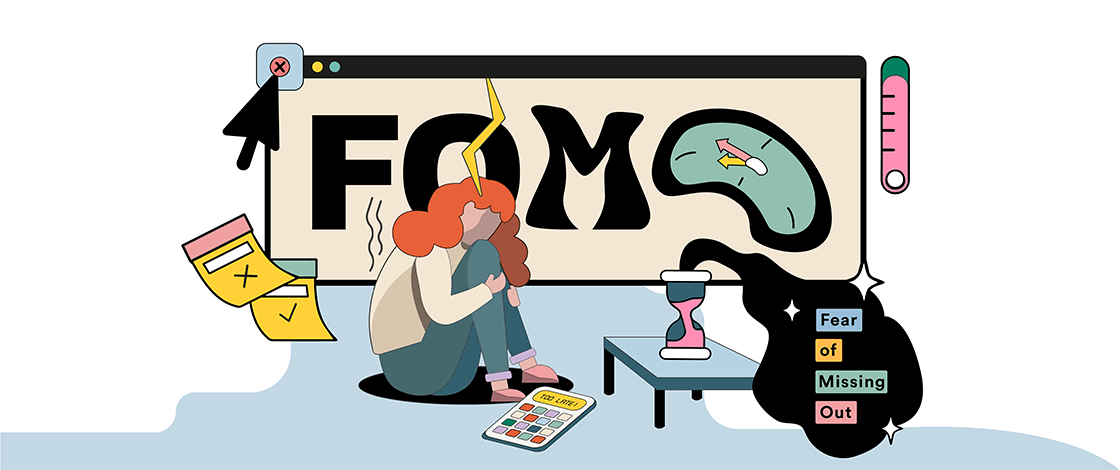
Feeling excluded in these circumstances is a sign we believe we’re entitled to be there. Having these feelings isn’t an unforgivable sin. Recognizing them and using them as a catalyst for working toward a better understanding of the marginalized group and ourselves is great! It’s part of all the hard self-actualization work that makes us more interesting.
Choosing instead to angrily express those feelings of exclusion as if it’s the fault of the marginalized group reveals an unflattering picture of ourselves. We are then much less likely to be invited to those spaces in the future, and the cycle of resentment will pull us farther and farther away from the coolness we desire.
Even if we’ve never personally, knowingly, intentionally contributed to the marginalization of the group whose culture we think is cool, it doesn’t entitle us to inclusion in their spaces.
The Dirty ‘P’ Word
It’s a word many dislike applied to them, but everyone has a few forms of it, but let’s be clear:
Living freely in the world outside of the small corners where the marginalized escape to is the essence of privilege.
One of the most uncomfortable aspects of privilege is that it exists in a zero sum environment. To do well in our society, where no resource is infinite, is to benefit from others doing poorly. Wal-Mart benefits from small local businesses shutting down. GrubHub shareholders receive a windfall from a pandemic keeping everyone at home. Homeowners benefit from rising rents in their neighborhood when their property values rise in relation.
This isn’t inherently horrible — though the extent to which one profiteers from human suffering before it becomes evil is certainly debatable. It’s a reality of modern western society and our ingrained concepts of ownership.
Having privilege is not what keeps one from their invitation to the party. Being unwilling to admit one’s privileges, face the implications of that, and show empathy for those less fortunate in one’s words and actions is. Those are the polar opposites to self-awareness, bravery, personal growth, and responsibility that define coolness in the adult world I inhabit.
If someone reading this feels they’re ready for invitations to these spaces, ask your closest queer friend or relative. Ask them in private, make sure they know a no is okay, and be ready to gracefully answer some follow-up questions. If you don’t have one, pause for a moment to consider why that may be and then ask me.
Earnest Questions are Always Welcome
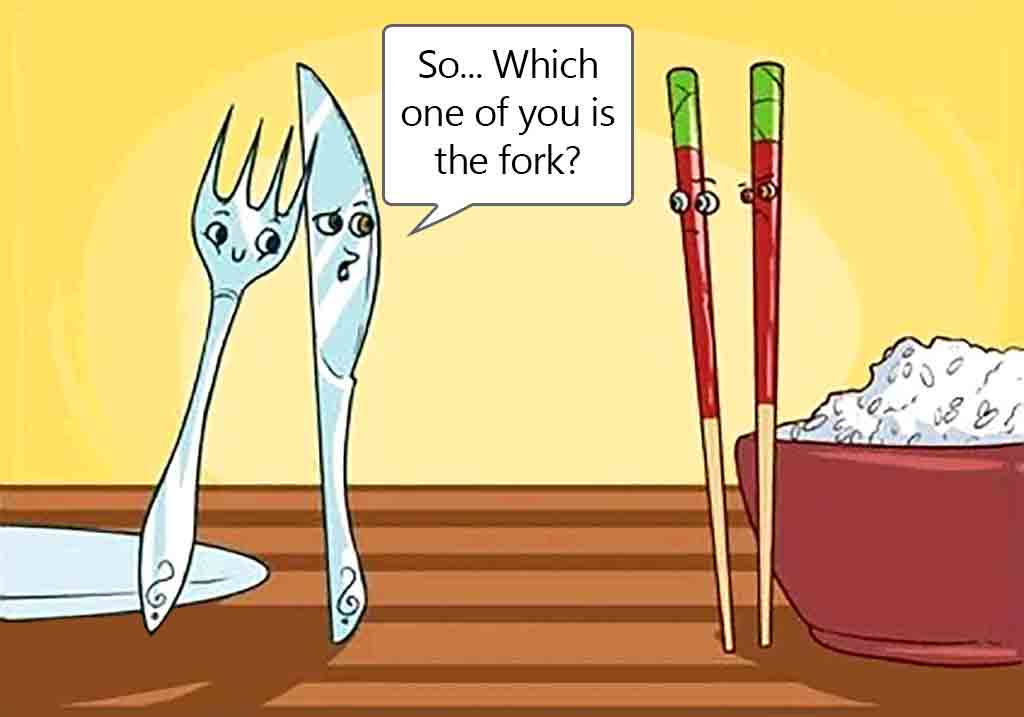
Despite the sharpness I occasionally used to answer these particular questions, I want to emphasize: kind questions seeking understanding are always welcome. I know the ones who’ve asked me these are genuinely curious about my perspective. Many probably had an inkling of some of my responses here, but didn’t know my full history or didn’t want to assume my reasoning.
I also know not everyone lives in the spaces I do. We all have a much clearer understanding of our identities than anyone else ever can, and we gravitate toward communities that understand us. People outside of my bubble can’t be expected to keep up with all the new developments there, so I appreciate those who reach out and ask for updates. Please keep trying to understand; I’m doing the same.
And I’m glad you think I’m cool. 😉
